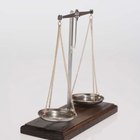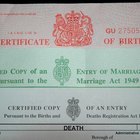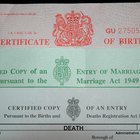
Am I an heir to an estate? If a family member dies, it's natural to wonder if you are in line to inherit anything. Only the closest living family members inherit if the person did not leave a will. But if the deceased left a will, anyone named in a will can inherit regardless of family association.
Am I an Heir to Money?
If someone dies without a will, the property passes by "intestate succession" to near relatives of the person who died. State laws specify the order in which close relatives inherit. The person to inherit is termed the "heir" or the "heir at law." Court-appointed administrators are in charge of finding heirs to estates.
Most intestate succession statutes establish the heirs in this order: surviving spouse, the children, the parents and the siblings. If there is no surviving spouse or parents, the decedent's children may inherit everything. If there are no kids or parents, the surviving spouse inherits. If the decedent didn't leave either a spouse or children, many states name the decedent's parents and/or siblings as the heirs. After that comes other relatives such as aunts and uncles, nephews, nieces, cousins and grandparents in the order the state statute specifies.
To figure out whether you are an heir to an estate, check the state intestate succession statute and determine where your relationship falls on the legal spectrum. If you are the dead person's only relative or the closest relative under state law, you are the heir.
Am I the Beneficiary of an Estate?
If a person dies and leaves a will, the people or organizations named in the will inherit. They are called "beneficiaries," not heirs. Beneficiaries can be relatives, but in most cases, a person writing a will can simply leave his property to whomever or whatever he wishes, from his postman to his favorite charity. A surviving spouse may be entitled to a share, however, even if not named in the will.
If you have reason to believe that you might have been named the beneficiary of the estate of someone who died, it's not hard to find out. Simply contact the executor, the person in charge of shepherding the will through the probate process, and ask her. Alternatively, walk into probate court in the town in which the deceased person lived and ask to see the file. Just give the clerk the deceased person's name and the date of death. The will should be one of the first documents in the file, so you won't have any trouble finding it.
Related Articles

How to Search Death Records for Free ...

Kansas Runaway Laws

How Can I Get My Dad's Death Records ...

How to Contest a Will in Louisiana

Louisiana Justice of the Peace Wedding ...

Can a Notary Marry Someone in Georgia?

How to Find Out if Someone Got Married ...

The Effect of a Legal Separation in the ...

How to Find Someone by the Town That ...

How to Place a Divorce Notice in a ...

How Does a Marriage License Work?

How to File a Motion for Divorce if a ...

How to Petition to Terminate the ...

How to Find Bank Accounts of Deceased ...

Help With Funeral Payments for ...

How to Legally Change a Child's Last ...

How to Get a Marriage Annulled in the ...

How to Obtain a Death Certificate in ...

How to Find a Birth Certificate for Free

How to File for Legal Separation in ...
References
Resources
Warnings
- There are times when wills and trusts are contested and go into probate. If this is the case, it can be several years before assets or property are distributed. If the case goes into probate, contact a probate attorney.
Writer Bio
With a Master's in English, a Master of Fine Arts in Creative Writing, and J.D. from U.C. Berkeley's law school, Teo Spengler is up on education. She splits her home time between San Francisco and France. A perpetual student and frequent teacher, she is also a writer and world traveler. Her work has appeared in numerous online publications including USA Today, Legal Zoom, eHow Business, Livestrong, SF Gate, Arizona Central, Fairmont Houston Chronicle, Navy Federal Credit Union, Pearson, Quicken.com, TurboTax.com, and numerous attorney websites.
Photo Credits
signing a contract image by William Berry from Fotolia.com